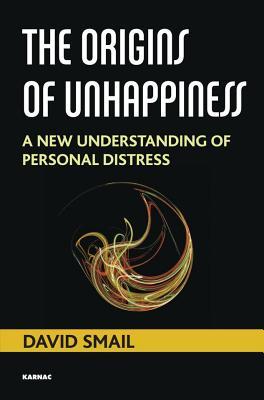Book Notes: The Origins of Unhappiness by David Smail

Finished May 22, 2020
A complex and critical work that takes psychology and psychotherapy to task for their failure to account for power and its role in producing the phenomena they study and treat.
David Smail was a psychologist, who spent much of his career working in the Mental Health departments of the National Health Service in the UK. This book draws on that experience, as well as his own social and philosophical analysis, to articulate the idea that “emotional distress” (his preferred alternative to the standard descriptor mental disorders) emerges from a tension between an individual and their location within fields of social power, particularly class power. Smail wrote the book in the early 1990s, and saw firsthand the “explosion in the expansion of the therapy and counselling industry in Britain.” (112) He aligns this explosion with the simultaneous expansion of Business culture, or what would later be called flexible or neo-liberal capitalism, and sees the two as linked in their disarticulation of people from forms of community and reconstitution as individuals unmoored from society.
His critiques of therapy are three**-**fold. First, therapy focuses attention on individuals or families and away from broader social or environmental factors that spur distress. It reinscribes social inequality as personal failure, read as psychological or mental instability. Second, the doctor-patient relationship of therapy is limited in how much it can effect such factors, and therefore any positive outcomes are likely related to the establishment of that relationship, and not on the actual causes of distress. Thirdly, because it is routinely a commercial enterprise itself, therapy amounts to a kind of commoditized form of solidarity that is dependent upon one’s class position and relative social power for efficacy. It is likewise easily inserted into other relationships as a mechanism of obscuring or side-stepping power and inequality–Smail mentions ‘redundancy counsellors’ hired by firms in England whose purpose was to provide therapy to fired workers upon their termination, and whose deployment was seen as a humane benefit. Essentially, Smail’s book is an exploration of the socio-psychological experience of the Marxist concept of alienation.
To make this provacative claim, Smail recasts psychology not as the study of constituent parts of human personality, but as a kind of phenomenological study of the relationship of human bodies to their social environments at multiple scales, and the meaning systems “which reflect [people’s] struggles to represent and talk about what it is like to be a body in a world.” (230) This profoundly materialist analysis requires an understanding of power as it operates on people, and as they make sense of those operations. He sees emotional distress in a person as a response to an inability to access or even comprehend the action of power on their body, particularly power operating at a distance.
Smail argues that instead of a personalized, commoditized vision of therapy to treat emotional distress, we should instead invest in solidarity–the recognition of our shared experience as bodies in the world that can experience pain and distress. He argues that a relationship of mutual care, in which the impacts of social power are not just recognized but actively confronted, is a better basis for handling such distress than an anemic, individualizing therapy that focuses only on a persons interior life.
As a case study, he uses the 1980s and several patients that he worked with, encountered, or treated during this time of neoliberal upheaval and the implemention of Margaret Thatcher’s famous dictum that there is no such thing as society, only individual and families. He draws on the sociology and economics of the period to contextualize the 1980s as a time in which understandings of the relationship of individuals to their power horizons were being reconfigured towards exalting business. This had profound consequences for the meanings that people made of their own lives, and therefore their feeling of personal wellbeing, and Smail explores the impact of these changes on several pseudonymous people.
I found this book fascinating, and I also recognized that there are others better suited to evaluate its provacative claims than I. For one thing, the line between emotional distress and psychosis (particularly complex psycho-phenomena like schizophrenia, bipolar disorder, post-traumatic stress disorder, etc…) is not well-defined and Smail doesn’t spend a lot of time thinking through the implications of compartmentalizing such phenomena as “emotional distress.” I find it hard to believe that 100+ years of psychological diagnosis and its long-term work identifying and describing conditions of psychotic or neurotic behavior has simply been an exercise in self-perpetuation (which he suggests in numerous places). At the same time, it is true the psychology has frequently pathologized aspects of human behavior in ways that are now seen as harmful.In any case, Smail is writing a synthetic polemic, and as such, may have smoothed over complexity in ways that might deserve further scrutiny later, or by someone else.
All in all, The Origins of Unhappiness is a complex, deeply humanistic work that sets out an ethical vision of our treatment of each other that, while perhaps a bit unnuanced, is forthright, deeply considered, and politically righteous.





